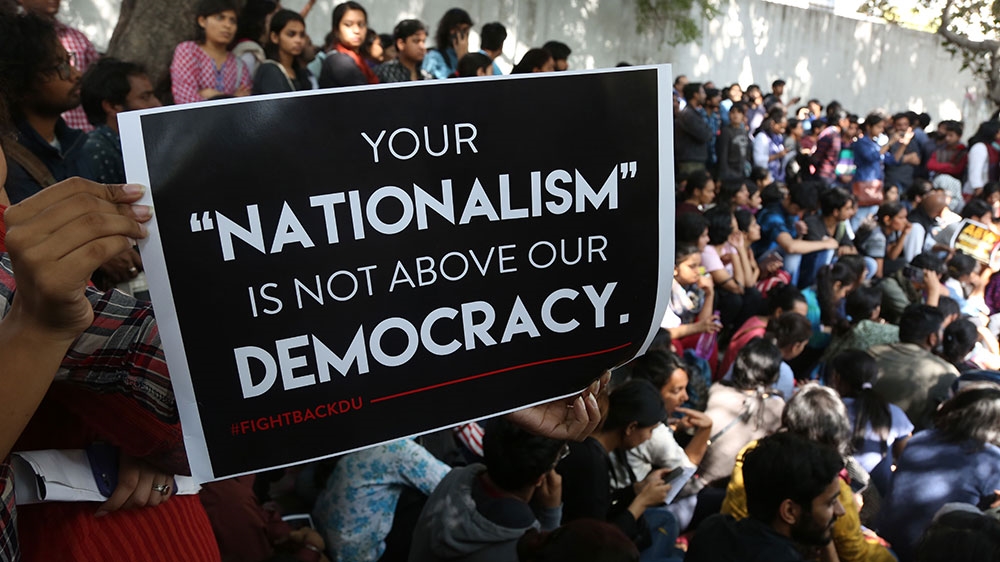by Amit Singh 27 August 2018
With Prime Minister Narendra Modi’s right-wing Bharatiya Janata Party in power, hardcore nationalist and fundamentalist forces have been emboldened to suppress free expression and dissent — anyone criticising government are termed as anti-national, and being slapped with sedition and defamation charges. Indian Constitution not only empowers media and free thinkers, but also those who are religiously and easily offended, where they can pursue criminal charges against editors and reporters. Particular concern is the Article 295A, 124 A and Article 298 in the Indian Penal Code. These laws have been turned around to hurt most those people who exercise their right to free speech as individuals living in a secular and free country[i].
More alarming is the blatant abuse of colonial era sedition law contained in section 124 A of the Indian Penal Code, which makes punishable offense if one create hatred or contempt for or disaffection towards the government. This section forms part of chapter VI of the Indian Penal Code that deals with offences against the State, a passage that deals with serious offences including waging war against the State.
Thus, multicultural Indian society have become problematic where anyone can be punished for voicing his or her opinion on the basis of “to excite dissatisfaction against the government,” “promote disharmony,” “prejudicial to national integration,” and expressions that are “lascivious,” “intended to outrage religious feelings,” or defamatory.
One such example of such cases is Amnesty International India[ii], which is accused of sedition in India for promoting anti-India sentiments. Amnesty was slapped sedition charges under pressure from right-wing activist, for providing a platform for the families of victims of human rights violations in Jammu and Kashmir to voicing their anger and frustration.
A case of sedition was filed against actor-turned- politician Ramya, a Congress politician, for not sharing an opinion that ‘Pakistan is not hell’, an opinion shared after a recent visit to the country and retort to Defence Minister Manohar Parrikar’s recent proclamation that “going to Pakistan is like going to hell”.
“I will not apologise as I have done nothing wrong. I am entitled to my views and that is what democracy is about,” Ramya told NDTV[iii], alleging that sedition laws are misused against “anybody and everybody”. This incidence reflects the level of intolerance against the freedom of expression. This example also demonstrates how one can be penalised for having dissenting opinion from national ideological narrative.
It seems, so far, Hindu fundamentalist have succeeded in threatening (in court of law and in public by means of intimidation, physical violence and killings) publishers to withdraw publication, exerting pressure to censor films deemed offensive to their political agenda, and silencing any critical voices contesting the Hindu religious myths and legends including criticizing the government. The Hindus: An Alternative History, a 2009 book by Wendy Doniger, was ceased to published under the treat by Dina Nath Batra, who heads a right wing Hindu nationalist groups and driven by the ideology of Hindutva[iv]. The Hindutva forces are actively contesting and trying to limit the liberal space for those having different religion and alternate sexual orientations.
Those in power use not only physical force but also erase alternative interpretations and silence those who subvert, critique and dissent to ensure their version of history and religion prevails . And those who dare to speak have met the fate of Gauri Lankesh, MM Kalburgi, Narendra Dhabolkar and Govind Pansare[v] who were killed by Hindu radical groups for critiquing Hindu religion orthodoxy and fanaticism.
However, what is more alarming is the openness with which these radicals and fundamentalist forces operate in contemporary Indian politics, where nationalistic and fundamentalist tendencies are pitching and posing serious threat to free thinking and freedom of expression. It is those forces abusing section 124 A of the IPC is quite to “instil fear and scuttle dissent” to the critiques of government.
However, in a welcome move, Supreme Court declared, that, “Sedition or defamation cases cannot be slapped on anyone criticising the government”. SC has ruled that sedition only applies when there is incitement to violence[vi]. This was clear message to those abusing the law to please their political bosses or stifle the dissent. Thus, criticising government is not sedition and defamation as being promulgated by the fundamental forces to repress those voicing the dissent and restrict the freedom of expression.
Democracy and freedom of expression go hand in hand. Any attempt to restrict free expression would jeopardise the basic fabric of Indian democracy, which at the moment, seems going through the crisis.
[i] http://peoplesbookshop.com/product/the-conflicts-of-freedom-of-expression-and-religion/
[ii] https://cjp.org.in/human-rights-under-the-modi-regime/
[iii] https://www.ndtv.com/karnataka-news/actor-politician-ramya-faces-sedition-case-for-pakistan-not-hell-comment-1448902
[iv] https://www.jstor.org/stable/24483313?read-now=1&googleloggedin=true&seq=1#page_scan_tab_contents
[v] https://indianexpress.com/article/india/gauri-lankesh-mm-kalburgi-narendra-dhabolkar-govind-pansare-murder-case-5324826/
[vi] https://www.thehindu.com/opinion/op-ed/its-not-sedition/article19127784.ece



0 Comments
LEAVE A COMMENT
Your email address will not be published